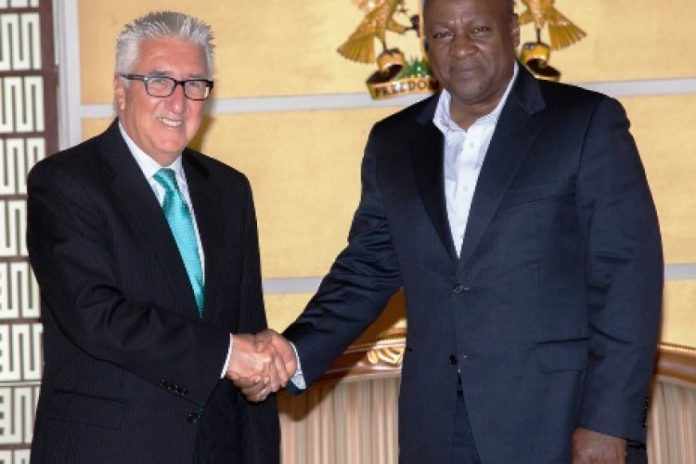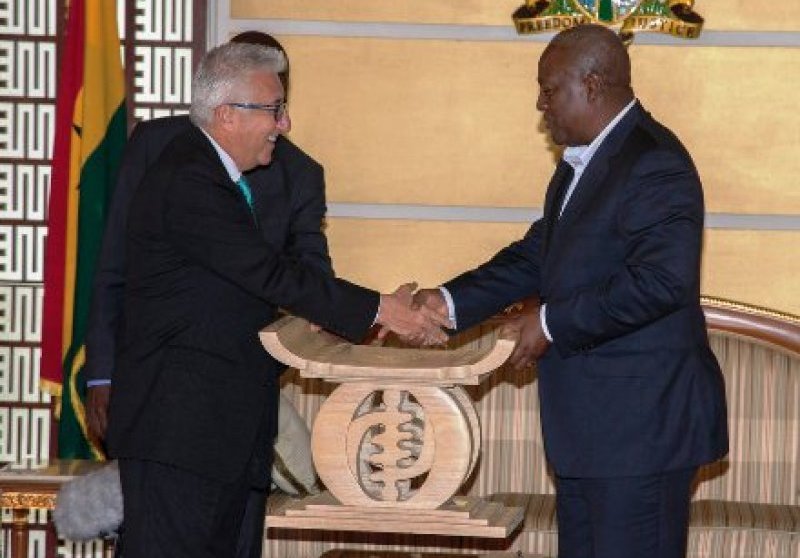
|
Getting your Trinity Audio player ready...
|
Ghana escaped recording an Ebola case by a whisker when the disease swept across the sub-region. Official U.S records perused by Dailymailgh.com reveal that the Liberian-American citizen, Patrick Sawyerr, an infected person with Ebola had spent time at the Kotoka International Airport in the capital, Accra in transit lounge before flying on to Nigeria, where he spread the disease before dying.
Dailymailgh.com understands tensions were rising in the diplomatic circles in 2014, as it was not clear the measures the John Mahama-led administration was taking to prevent the disease from entering into the country.
Therefore, the US Embassy had to marshal its personnel and use its influence to put pressure on President Mahama and his government to confront the disease head-on before it crosses over into the shores of Ghana.
Then US ambassador to Ghana, Gene Allan Cretz, according to the U.S Foreign Service Journal – January to February 2018 edition, rallied his personnel including officials from the USAID “to plan for a potential outbreak” in Ghana.
“We knew it was highly likely that Ebola could not be stopped at the border. The virus is transmitted through direct contact with blood or other bodily fluid from an infected person, and the illness raged only a few hundred miles to our west. Yet we believed it incumbent on us to do our utmost to help the government of Ghana contain and defeat Ebola’s spread should it get past the doorstep,” wrote Jim Bever, a Foreign Service officer with USAID for 35 years.
Ghana had already agreed to the United Nations proposal to set up its regional response logistical base at the airport in Accra to service the three most-affected countries. It had also developed a “National Preparedness and Response Plan for Prevention and Control of Ebola,” with the help of the US and others, which included establishing a Cabinet-level interministerial coordination committee.

However, according to Bever, who was in Ghana then, “the pace of the plan’s implementation was slow. We were concerned that two or three levels down, the government of Ghana did not seem to share our sense of urgency or that of its official donor group (which USAID chaired). The people’s knowledge about Ebola and about the cultural and behavioral changes that would be needed to contain a possible outbreak was still minimal. The press was full of outbreak rumors. It was unclear whether the government’s security agencies would be prepared for possible massive investigations, quarantining and riot control (already underway in Liberia). There was little confidence that anyone had the authority to direct daily operational command and control in case of an out – break, and it was unknown whether health workers would stay on the job to battle the disease. We and our fellow assistance donors, along with international security and health experts, judged that, so far, the preparedness actions Ghana had taken were necessary but not yet sufficient for its own protection”
Realising that the government of Ghana then was slow in implementing measures to protect the country from Ebola, the US Embassy pushed for a “straight-talking” briefing with high level government officials at the presidency. The Embassy had to invite Nigeria’s most experienced epidemiologists, Dr. Akin Oyemakinde, to Ghana to let the Mahama government know the measures they took and why the Ghanaian government needed to be on top of issues.
Bever revealed: “On Oct. 9, 2014, the combined U.S. embassy team (Ambassador Cretz, USAID, CDC and the Defense Department’s defense cooperation officer) and the Nigerian epidemiological team entered the Cabinet Secretariat of the Ghanaian president. President Mahama’s chief of staff presided, joined by the minister of health, the minister of the interior, the minister of communications and Ghana’s minister of defense. First, Ambassador Cretz laid out America’s interest in helping Ghana, and then the Ghanaian officials shared their progress in preparedness. The officers from CDC, USAID and DOD gave their observations and recommendations, offering to continue to assist Ghana and to further marshal the country’s official donors group.”
“The Ghanaian officials with whom we had talked were so seized with the briefing and the gravitas of the Nigerian experience that President Mahama agreed to change the agenda so that his officials could brief attendees about what had just transpired. The next morning we learned in the Ghanaian press the extent of the impact we’d had. President Mahama and his Cabinet had agreed to establish an Inter-Ministerial Task Force on Ebola to streamline the chain of command and control. They also appointed the highly revered deputy minister of health as incident commander for Ebola. In addition, they activated a life insurance package for health workers to motivate them to stay on the job battling the disease in case of an outbreak, knowing that their families would be taken care of if they died due to their service. All of these critically important decisions had been pending for months.”
“Finally, we knew that Ghana was as prepared as it could possibly be. And we could all sleep a bit easier that night. Perseverance, political astuteness and creative diplomacy in reaching out to the Nigerians; our embassy’s timely access to and credibility with the top of Ghana’s government; and successful U.S. government interagency teamwork with CDC’s outstanding experts made a real difference for Ghana—and, ultimately, for our own country as well,” Bever concluded in his write-up in the Foreign Service Journal.
Source: Daily Mail GH




